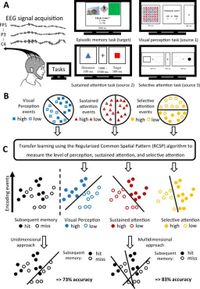Researchers have leveraged machine learning to unlock the secrets of memory, revealing how multidimensional factors such as visual perception and sustained attention influence what we remember and forget.
This advancement provides insights into the mechanisms behind episodic memory formation and may lead to improved cognitive interventions.
The study highlights the importance of considering multiple cognitive functions when analyzing memory performance, moving beyond traditional unidimensional approaches.
Understanding why certain events are remembered while others are forgotten remains one of psychology's major questions. This research not only contributes to basic science but could enhance learning and memory interventions across various settings, such as workplaces and educational institutions.
By applying a cutting-edge machine learning algorithm called transfer learning, researchers identified how various brain states associated with cognitive functions contribute to episodic memory performance. This innovative approach incorporates aspects of perception and attention, enabling a more comprehensive understanding of the encoding processes that lead to successful memory formation.
In their experiments, 43 participants were monitored using electroencephalography (EEG) as they performed a series of cognitive tasks, including visual perception, sustained attention, selective attention, and an episodic memory task. Through this process, researchers trained classifiers to differentiate between high and low levels of cognitive function, which were subsequently applied to predict memory outcomes.
The results were striking: the machine learning approach improved prediction accuracy for memory success from a previous 72% to an impressive 81%, indicating the value of considering the interplay of different cognitive elements during encoding. This contrast underscores significant limitations in earlier studies that primarily focused on memory as a binary outcome.
The researchers foremost identified three cognitive domains—visual perception, sustained attention, and selective attention—each contributing unique variance to memory prediction. Notably, the greatest gains were observed when all three domains' brain states were accounted for, suggesting that traditional methodologies missed critical dimensions of memory encoding.
Moreover, the study highlighted how memory performance relates to time-on-task effects, where continued encoding could diminish active cognitive engagement, akin to mental fatigue. The researchers found that participants exhibited a decrease in cognitive engagement over time, which may have implications for how we approach learning tasks.
By elucidating the connection between cognitive effort and memory encoding, the findings pave the way for future applications in personalized learning strategies. For example, adaptive memory intervention systems could utilize real-time feedback to help individuals enhance their memory performance based on their cognitive engagement levels at any given moment.
Furthermore, the notion of memory history emerged as a vital component. Events that are precluded by successful encoding may further bolster cognitive processes for subsequent events, indicating that effective memory situations are as much about past performance as they are about present engagement.
The implications are profound. By understanding the cognitive metrics that underlie memory encoding, the potential exists for creating tailored strategies that boost retention and recall effectiveness. This approach could fundamentally shift how students learn, how professionals remain sharp in their work, and many other real-world applications.
As research continues to delve into the complexities of memory, this multidimensional evaluation of cognitive processes will likely inform innovative training methodologies that can mitigate memory lapses and enhance our cognitive abilities.

